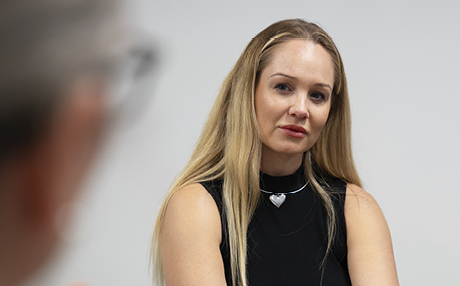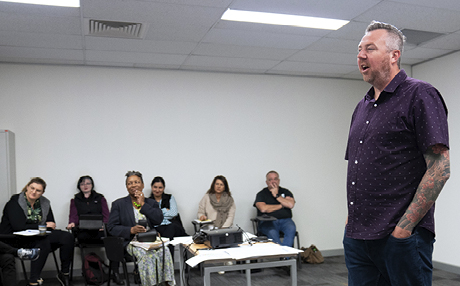Counselling
Vocational Courses
- Diploma of Counselling
- Diploma of Mental Health
- Diploma of Financial Counselling
- Certificate IV in Mental Health
- AIPC Upskill
Higher Education Courses
Community Services
Vocational Courses
- Diploma of Community Services
- Diploma of Youth Work
- Diploma of Alcohol and Other Drugs
- Certificate IV in Youth Work
- Certificate IV in Alcohol and Other Drugs
Higher Education Courses
Allied Health
Vocational Courses
- Diploma of Practice Management
- Diploma of Remedial Massage
- Certificate IV in Dental Assisting
- Certificate IV in Health Administration
- Certificate IV in Allied Health Assistance
- Certificate IV in Massage Therapy
- Certificate III In Dental Assisting
- Certificate III in Health Administration
- Certificate III Allied Health Assistance
- Certificate III in Individual Support
- More...
- Apply Online
Higher Education Courses
Education & Care
Vocational Courses
About
Networks & Resources
- Diploma of Practice Management
- Diploma of Remedial Massage
- Certificate IV in Dental Assisting
- Certificate IV in Health Administration
- Certificate IV in Allied Health Assistance
- Certificate IV in Massage Therapy
- Certificate III In Dental Assisting
- Certificate III in Health Administration
- Certificate III Allied Health Assistance
- Certificate III in Individual Support
- More...
- Apply Online
Home/ Upskill Courses
Explore our Short Course Micro-credentials
Our digitally badged short course micro-credentials will provide you with new skills and a deeper understanding in a range of important areas. Each program is carefully crafted to enhance your personal and professional development. Each short course micro-credential is between 20 and 40 hours of deep, rich, learning. Learn more about our programs below.
Filtered by
- Filtered by
- Most Recent
- Most Popular
-
Trauma-Informed Practice and Care
Working within the helping profession, you will frequently encounter clients who have experienced trauma, whether they are seeking support in relation to the trauma itself or to something else entirely. It is therefore essential to understand trauma and its impacts in order to develop competency to work in a safe and effective way with clients.
![AIPC-Upskill-Logo]()
![Trauma-Informed Practice and Care Cover Image]()
-
At its base, mindfulness can be considered a natural human state whereby individuals experience and attend to the present moment. Mindfulness interventions to train individuals how to incorporate this practice into daily life have been around for thousands of years, considered to have been initiated through Buddhist teachings as a way of finding spiritual enlightenment.
![AIPC-Upskill-Logo]()
![Mindfulness in Therapy Cover Image]()
-
Health concerns are something that will affect every human on the planet in one way or another. It may be simple things like a stomach bug, an injury or more serious conditions requiring hospitalisation and drastic changes in one’s life.
![AIPC-Upskill-Logo]()
![Health Counselling Cover Image]()
-
Counselling is a multifaceted profession, ranging from short to long term interventions. At its core, it seeks to assist clients to have increased personal growth. For therapists, a rewarding aspect is assisting clients to reach “light-bulb” moments where they understand their own growth.
![AIPC-Upskill-Logo]()
![Assessment in Counselling Cover Image]()
-
Recognising and Responding to Domestic and Family Violence
Domestic and family violence is a pattern of abusive behaviour that involves one person seeking to control and dominate another person. Domestic and family violence is not always physical – it can involve a range of different forms of abuse.
![AIPC-Upskill-Logo]()
![Recognising and Responding to Domestic and Family Violence Cover Image]()
-
Dialectical Behaviour Therapy (DBT) is a cognitive behavioural treatment developed by Dr Marsha M. Linehan in the 1980s, originally designed to treat female patients with Borderline Personality Disorder, and high suicidality.
![AIPC-Upskill-Logo]()
![Dialectical Behaviour Therapy Cover Image]()
-
Creative and Critical Thinking
In this micro-credential you’ll learn the IDEALS model for creative thinking, including an examination of the roles of problem identification, ideation and critical evaluation. You learn how to look at problems through different lenses, see problems as opportunities for change, identify and escape thinking traps, examine and reimagine solutions, iterate ideas and test theories, and much more.![AIPC-Upskill-Logo]()
![Creative and Critical Thinking Cover Image]()
-
In this micro-credential you’ll learn about mental health issues that occur across the lifespan. You’ll learn conceptually about mental health, understanding supports and interventions, working positively with people with mental health issues, identifying and responding to risk, and more.
![AIPC-Upskill-Logo]()
![Working with Mental Health Cover Image]()
-
Acceptance and Commitment Therapy
In this micro-credential you’ll learn about the hugely popular modern behavioural therapy, Acceptance and commitment therapy (ACT). ACT aims to help people live a rewarding and meaningful life while accepting the presence of unwanted and often unpleasant thoughts, emotions, memories, urges and sensations that inevitably occur.![AIPC-Upskill-Logo]()
![Acceptance and Commitment Therapy Cover Image]()
-
Emotionally Intelligent Leadership
In this micro-credential you’ll learn the highly desired workplace skill of Emotional Intelligence (EI). EI is the ability to monitor your own emotions as well as those of others. By developing your EI, you’ll be able to better understand others, including what motivates others, work more cooperatively with them, and better negotiate with others.![AIPC-Upskill-Logo]()
![Emotionally Intelligent Leadership Cover Image]()
-
In this micro-credential you’ll learn effective ways to work with teens as they transition through this dynamic period of their lives. You’ll learn how to help them navigate social media and online communities; peer pressure and bullying; use of alcohol and drugs; risky behaviours; romantic relationships, trauma, and more. You’ll also learn to use the public health model when using a harm minimisation approach in these areas.
![AIPC-Upskill-Logo]()
![Working with Adolescents Cover Image]()
-
Mental Wellbeing in the Workplace
In this micro-credential you’ll learn how to support employee wellbeing, gain an understanding of factors that can negatively impact on the psychological health of workers, and learn strategies to support the ongoing mental wellbeing and address psychological concerns if and when they arise.![AIPC-Upskill-Logo]()
![Mental Wellbeing in the Workplace Cover Image]()
-
Diverse Genders and Sexualities
In this micro-credential you’ll learn how to work effectively with LGBTIQ+ clients. You’ll learn about the specific challenges and areas of risk faced by the LGBTIQ+ population, including depression and suicide. You’ll review the benefits and limitations different therapeutic approaches can have when working with a client from the LGBTIQ+ community. And you’ll work through five case studies.![AIPC-Upskill-Logo]()
![Diverse Genders and Sexualities Cover Image]()
-
In this micro-credential you’ll learn how to work effectively with children as your client, which is uniquely rewarding and challenging. You’ll gain awareness of their developmental stages, including examining attachment styles and how to develop a child-centric approach to practice. You’ll learn how to work with other stakeholders, such as parents, caregivers, schools, etc. And you’ll learn to work with trauma and various health conditions (illness, disability, ASD, ADHD, learning difficulties, anxiety, etc).
![AIPC-Upskill-Logo]()
![Working with Children Cover Image]()
-
In this micro-credential you’ll learn about mental health issues that occur across the lifespan. You’ll learn conceptually about mental health, understanding supports and interventions, working positively with people with mental health issues, identifying and responding to risk, and more.
![AIPC-Upskill-Logo]()
![Working with Mental Health Cover Image]()
-
Dialectical Behaviour Therapy (DBT) is a cognitive behavioural treatment developed by Dr Marsha M. Linehan in the 1980s, originally designed to treat female patients with Borderline Personality Disorder, and high suicidality.
![AIPC-Upskill-Logo]()
![Dialectical Behaviour Therapy Cover Image]()
-
At its base, mindfulness can be considered a natural human state whereby individuals experience and attend to the present moment. Mindfulness interventions to train individuals how to incorporate this practice into daily life have been around for thousands of years, considered to have been initiated through Buddhist teachings as a way of finding spiritual enlightenment.
![AIPC-Upskill-Logo]()
![Mindfulness in Therapy Cover Image]()
-
Health concerns are something that will affect every human on the planet in one way or another. It may be simple things like a stomach bug, an injury or more serious conditions requiring hospitalisation and drastic changes in one’s life.
![AIPC-Upskill-Logo]()
![Health Counselling Cover Image]()
-
Counselling is a multifaceted profession, ranging from short to long term interventions. At its core, it seeks to assist clients to have increased personal growth. For therapists, a rewarding aspect is assisting clients to reach “light-bulb” moments where they understand their own growth.
![AIPC-Upskill-Logo]()
![Assessment in Counselling Cover Image]()
-
Recognising and Responding to Domestic and Family Violence
Domestic and family violence is a pattern of abusive behaviour that involves one person seeking to control and dominate another person. Domestic and family violence is not always physical – it can involve a range of different forms of abuse.
![AIPC-Upskill-Logo]()
![Recognising and Responding to Domestic and Family Violence Cover Image]()
-
Mental Wellbeing in the Workplace
In this micro-credential you’ll learn how to support employee wellbeing, gain an understanding of factors that can negatively impact on the psychological health of workers, and learn strategies to support the ongoing mental wellbeing and address psychological concerns if and when they arise.![AIPC-Upskill-Logo]()
![Mental Wellbeing in the Workplace Cover Image]()
-
Diverse Genders and Sexualities
In this micro-credential you’ll learn how to work effectively with LGBTIQ+ clients. You’ll learn about the specific challenges and areas of risk faced by the LGBTIQ+ population, including depression and suicide. You’ll review the benefits and limitations different therapeutic approaches can have when working with a client from the LGBTIQ+ community. And you’ll work through five case studies.![AIPC-Upskill-Logo]()
![Diverse Genders and Sexualities Cover Image]()
-
In this micro-credential you’ll learn how to work effectively with children as your client, which is uniquely rewarding and challenging. You’ll gain awareness of their developmental stages, including examining attachment styles and how to develop a child-centric approach to practice. You’ll learn how to work with other stakeholders, such as parents, caregivers, schools, etc. And you’ll learn to work with trauma and various health conditions (illness, disability, ASD, ADHD, learning difficulties, anxiety, etc).
![AIPC-Upskill-Logo]()
![Working with Children Cover Image]()
-
Creative and Critical Thinking
In this micro-credential you’ll learn the IDEALS model for creative thinking, including an examination of the roles of problem identification, ideation and critical evaluation. You learn how to look at problems through different lenses, see problems as opportunities for change, identify and escape thinking traps, examine and reimagine solutions, iterate ideas and test theories, and much more.![AIPC-Upskill-Logo]()
![Creative and Critical Thinking Cover Image]()
-
Acceptance and Commitment Therapy
In this micro-credential you’ll learn about the hugely popular modern behavioural therapy, Acceptance and commitment therapy (ACT). ACT aims to help people live a rewarding and meaningful life while accepting the presence of unwanted and often unpleasant thoughts, emotions, memories, urges and sensations that inevitably occur.![AIPC-Upskill-Logo]()
![Acceptance and Commitment Therapy Cover Image]()
-
Emotionally Intelligent Leadership
In this micro-credential you’ll learn the highly desired workplace skill of Emotional Intelligence (EI). EI is the ability to monitor your own emotions as well as those of others. By developing your EI, you’ll be able to better understand others, including what motivates others, work more cooperatively with them, and better negotiate with others.![AIPC-Upskill-Logo]()
![Emotionally Intelligent Leadership Cover Image]()
-
In this micro-credential you’ll learn effective ways to work with teens as they transition through this dynamic period of their lives. You’ll learn how to help them navigate social media and online communities; peer pressure and bullying; use of alcohol and drugs; risky behaviours; romantic relationships, trauma, and more. You’ll also learn to use the public health model when using a harm minimisation approach in these areas.
![AIPC-Upskill-Logo]()
![Working with Adolescents Cover Image]()
-
Trauma-Informed Practice and Care
Working within the helping profession, you will frequently encounter clients who have experienced trauma, whether they are seeking support in relation to the trauma itself or to something else entirely. It is therefore essential to understand trauma and its impacts in order to develop competency to work in a safe and effective way with clients.
![AIPC-Upskill-Logo]()
![Trauma-Informed Practice and Care Cover Image]()
Students
About Us
Study Online
RTO Provider Number: 0670 | Institute of Higher Education: Provider ID PRV12083
CRICOS Provider Number: 04095M
Copyright © 2025 The Australian Institute of Professional Counsellors Pty Ltd.
Site by Greenhat - Web Design Brisbane
In the spirit of reconciliation, AIPC acknowledges the Traditional Custodians of country throughout Australia and their connections to land, sea and community. We pay our respect to their Elders past and present and extend that respect to all Aboriginal and Torres Strait Islander peoples today.


















